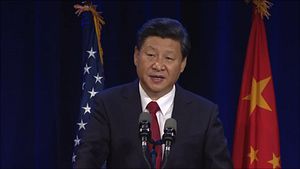Now that Chinese President Xi Jinping has wrapped up his first state visit to the U.S., we can assess how the Xi-Obama summit changed U.S.-China relations and what waits ahead for the most important bilateral relationship in the 21st century.
To be fair, nobody was seriously optimistic before the summit due to a number of sensitive issues that emerged in 2015 and set the bilateral relationship on a downward course. In early 2015, there was a fierce debate within the U.S. regarding the best way to deal with a more assertive and arrogant China. So much so that the renowned China scholar David Lampton called it a “tipping point” in U.S.-China relations. The atmosphere was certainly tense before Xi’s visit; and most analysts had modest expectations for the summit itself.
Within this interesting and complex context, it is thus a small relief that some agreements, however weak, were achieved by the two parties, particularly regarding cyber security and climate change. Both China and the U.S. agreed not to attack each other’s cyber infrastructure or steal trade secrets. Of course, words need to be followed by actions and this is where most analysts expect difficulties.
What is less positive, and indeed troubling, is that there is not much agreement in other important areas such as the South China Sea issue, the bilateral investment treaty (BIT), and military-to-military relations more broadly. While it is true that nobody had high hopes for breakthrough in these areas, no progress at all is worrying for a set of reasons.
To start with, this major summit between Xi and Obama has been in the making for pretty much the whole year, since both countries announced a visit would take place in February. One might ask a simple question: why are there so few deliverables after seven months of hard work and preparation? Is there something seriously wrong with U.S.-China relations on a fundamental level?
As one Chinese scholar recently commented, the state of U.S.-China relations seems to be in a dangerous mode. Namely, only a major summit by the top leaders from both countries can temporarily save the relationship. While this assessment might be too negative, it once again reminds us of the fragile nature of this complex relationship.
Many in China seem to accept the premise that “the U.S.-China relationship will be neither too good, nor too bad.” This seems to be the case on the surface, but if neither party works hard to maintain this already fragile relationship, things can become very ugly in a short time. Already, the renowned Chinese professor, Yan Xuetong, predicted that U.S.-China relations will encounter serious troubles by the end of this year. Why? Because by then, U.S. domestic pressures will push presidential hopefuls to condemn China for its poor human rights record and unfair trade practices, just like what Hillary Clinton said to Xi on Twitter recently. “Shameless” is the word she used for Xi, a rather strong and curious choice. There is little doubt that various presidential candidates will blast China in the coming months. Who will stand up and defend China then in the United States? There will be no more summitry between Xi and Obama.
This will leave us with structural forces in determining the future course of U.S.-China relations and that’s not a pretty picture at all. Despite all the weaknesses in its economy, China is still growing faster than the U.S. is and this means only one thing: China will catch up with the U.S. someday. Is the U.S. ready for this unprecedented change? Is China ready? The answer seems to be no for both countries. For good reasons, the U.S. is unwilling to admit its relative decline and, for other good reasons, China is not ready yet to lead the world. China is not a global power in traditional terms. It is, rather, an emerging great power with limited ambitions.
Perhaps this is the essence of what we should take away from the Xi-Obama summit: neither country is certain about the nature of the bilateral relationship. We live in a transitionary period and the smoke has not cleared yet. We just need more time to figure out ourselves and, in the meantime, we all need to maintain self-restraint. Let’s not do anything stupid.

































